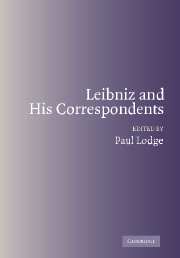Book contents
- Frontmatter
- Contents
- Contributors
- Abbreviations
- Acknowledgments
- 1 Introduction
- 2 Leibniz and His Master: The Correspondence with Jakob Thomasius
- 3 A Philosophical Apprenticeship: Leibniz's Correspondence with the Secretary of the Royal Society, Henry Oldenburg
- 4 The Leibniz–Foucher Alliance and Its Philosophical Bases
- 5 Leibniz to Arnauld: Platonic and Aristotelian Themes on Matter and Corporeal Substance
- 6 Leibniz and Fardella: Body, Substance, and Idealism
- 7 Leibniz's Exchange with the Jesuits in China
- 8 Leibniz's Close Encounter with Cartesianism in the Correspondence with De Volder
- 9 “All the time and everywhere everything's the same as here”: The Principle of Uniformity in the Correspondence Between Leibniz and Lady Masham
- 10 Idealism Declined: Leibniz and Christian Wolff
- 11 On Substance and Relations in Leibniz's Correspondence with Des Bosses
- 12 “[…] et je serai tousjours la même pour vous”: Personal, Political, and Philosophical Dimensions of the Leibniz–Caroline Correspondence
- References
- Index
7 - Leibniz's Exchange with the Jesuits in China
Published online by Cambridge University Press: 02 September 2009
- Frontmatter
- Contents
- Contributors
- Abbreviations
- Acknowledgments
- 1 Introduction
- 2 Leibniz and His Master: The Correspondence with Jakob Thomasius
- 3 A Philosophical Apprenticeship: Leibniz's Correspondence with the Secretary of the Royal Society, Henry Oldenburg
- 4 The Leibniz–Foucher Alliance and Its Philosophical Bases
- 5 Leibniz to Arnauld: Platonic and Aristotelian Themes on Matter and Corporeal Substance
- 6 Leibniz and Fardella: Body, Substance, and Idealism
- 7 Leibniz's Exchange with the Jesuits in China
- 8 Leibniz's Close Encounter with Cartesianism in the Correspondence with De Volder
- 9 “All the time and everywhere everything's the same as here”: The Principle of Uniformity in the Correspondence Between Leibniz and Lady Masham
- 10 Idealism Declined: Leibniz and Christian Wolff
- 11 On Substance and Relations in Leibniz's Correspondence with Des Bosses
- 12 “[…] et je serai tousjours la même pour vous”: Personal, Political, and Philosophical Dimensions of the Leibniz–Caroline Correspondence
- References
- Index
Summary
On December 2, 1697, Leibniz wrote to the Jesuit missionary Antoine Verjus that he would like more information regarding China,
Where I take such a part, because I judge that this mission is the greatest affair of our time, as much for the glory of God and the propagation of the Christian religion as for the general good of men and the growth of the arts and sciences, among us as well as among the Chinese. For this is a commerce of light, which could give to us at once their work of thousands of years and render ours to them, and double so to speak our true wealth for one and the other. This is something greater than one imagines.
(Wid 55)This “commerce of light” is a guiding principle throughout Leibniz's relationship with China, from his earliest encounter with the Jesuit mission, through the publication of the Novissima Sinica, to the founding of the Berlin Society of Sciences. Leibniz pursues this broader goal through a series of particular exchanges and negotiations, the most significant of which is between Leibniz and the Jesuits involved with the mission in China. “Commerce of light” is not a careless phrase but one directed specifically against the two forces then driving globalization and European expansion. The most powerful force was the valuable commerce of goods already connecting Europe with Asia, Africa, and the Americas. From an early age, Leibniz was well aware of the economic forces behind European expansion.
- Type
- Chapter
- Information
- Leibniz and his Correspondents , pp. 141 - 161Publisher: Cambridge University PressPrint publication year: 2004
- 1
- Cited by



